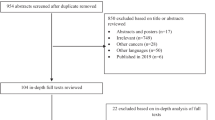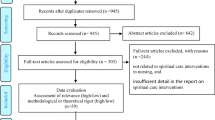Abstract
Background
Spiritual well-being is directly related to the quality of life in breast cancer patients. Mindfulness-based therapy interventions can decrease distress levels in women with breast cancer, while improving spiritual well-being.
Objective
To investigate the effect of mindfulness-based therapy on spiritual well-being in breast cancer patients.
Methods
This randomized controlled clinical trial was conducted in accordance with the Consolidated Standards of Reporting Trials. A total of 70 participants were enrolled from September, 2021 to July, 2022. Primary outcome included spiritual well-being, and secondary outcome included quality of life. The data were collected using the Patient Sociodemographic and Medical Data Form and Functional Assessment of Chronic Illness Therapy-Spiritual Well-Being (SpWB) (FACIT-Sp Version 4). In the statistical analysis, the independent sample t test and paired sample t test were used to examine the intervention effect on primary and secondary outcomes, according to numbers, percentage, mean, standard deviation, and conformity to normal distribution.
Results
The average age of the therapy group was 42.22 ± 6.86, and the control group was 41.64 ± 6.04. The average score of meaning (12.25 ± 3.03), overall score average of the spiritual well-being (31.56 ± 8.90), the emotional well-being (13.46 ± 5.78) and physical well-being (16.71 ± 5.59), and overall average score of the quality of life (66.98 ± 17.72) of the therapy group was statistically significantly higher (p < 0.05).
Conclusion
The mindfulness-based training may enhance the spiritual well-being and quality of life of breast cancer patients. Nurses should be encouraged for mindfulness-based training sessions to make it a widespread practice, and to regularly evaluate the results.
Trial registration
NCT05057078 (date: September 27, 2021).



Similar content being viewed by others
Data availability
The data that support the findings of this study are available upon reasonable request.
References
Duval A, Davis CG, Khoo EL, Romanow H, Shergill Y, Rice D, Smith AM, Poulin PA, Collins B (2022) Mindfulness-based stress reduction and cognitive function among breast cancer survivors: a randomized controlled trial. Cancer 128(13):2520–2528. https://doi.org/10.1002/cncr.34209
Sung H, Ferlay J, Siegel RL, Laversanne M, Soerjomataram I, Jemal A, Bray F (2021) Global cancer statistics 2020: GLOBOCAN estimates of incidence and mortality worldwide for 36 cancers in 185 countries. CA Cancer J Clin 71:209–249. https://doi.org/10.3322/caac.21660
Jing S, Zhang A, Chen Y, Shen C, Currin-McCulloch J, Zhu C (2021) Mindfulness-based interventions for breast cancer patients in China across outcome domains: a systematic review and meta-analysis of the Chinese literature. Support Care Cancer 29(10):5611–5621. https://doi.org/10.1007/s00520-021-06166-0
Lee Y, Baek JM, Jeon YW, Im EO (2019) Illness perception and sense of well-being in breast cancer patients. Patient Prefer Adherence 13:1557–1567. https://doi.org/10.2147/PPA.S225561
Würtzen H, Dalton SO, Christensen J, Andersen KK, Elsass P, Flyger HL, Pedersen AE, Sumbundu A, Steding-Jensen M, Johansen C (2015) Effect of mindfulness-based stress reduction on somatic symptoms, distress, mindfulness and spiritual wellbeing in women with breast cancer: results of a randomized controlled trial. Acta oncol 54(5):712–719. https://doi.org/10.3109/0284186X.2014.997371
Chang YC, Yeh TL, Chang YM, Hu WY (2021) Short-term effects of randomized mindfulness-based ıntervention in female breast cancer survivors: a systematic review and meta-analysis. Cancer Nurs 44(6):E703–E714. https://doi.org/10.1097/NCC.0000000000000889
Cramer H, Lauche R, Paul A, Dobos G (2012) Mindfulness-based stress reduction for breast cancer—a systematic review and meta-analysis. Curr Oncol 19(5):e343–e352. https://doi.org/10.3747/co.19.1016
Jiang N, Zhang YX, Zhao J, Shi HY, Wang T, Jin W, Wang JW, Yu JM (2022) The mediator role of stigma in the association of mindfulness and social engagement among breast cancer survivors in China. Support Care Cancer 30(6):5007–5015. https://doi.org/10.1007/s00520-022-06882-1
Yilmaz M, OnerCengiz H (2020) The relationship between spiritual well-being and quality of life in cancer survivors. Palliat Support Care 18(1):55–62. https://doi.org/10.1017/S1478951519000464
Dydjow-Bendek D, Zagozdzon P (2022) Breast cancer and spirituality among women in poland: a case-control study. J Relig Health 61(6):4288–4301. https://doi.org/10.1007/s10943-022-01584-8
Devi MK, Fong K (2019) Spiritual experiences of women with breast cancer in singapore: a qualitative study. Asia Pac J Oncol Nurs 6(2):145–150. https://doi.org/10.4103/apjon.apjon_77_18
Silva G, Reis D, Miranda T, Melo R, Coutinho M, Paschoal G, Chaves É (2019) Religious/spiritual coping and spiritual distress in people with cancer. Rev Bras Enferm 72(6):1534–1540. https://doi.org/10.1590/0034-7167-2018-0585
Hulett JM, Johnstone B, Armer JM, Deroche C, Millspaugh R, Millspaugh J (2021) Associations between religious and spiritual variables and neuroimmune activity in survivors of breast cancer: a feasibility study. Support Care Cancer 29(11):6421–6429. https://doi.org/10.1007/s00520-021-06224-7
Puchalski C (2012) Spirituality in the cancer trajectory. Ann Oncol 3:49–55. https://doi.org/10.1093/annonc/mds088
Kamijo Y, Miyamura T (2020) Spirituality and associated factors among cancer patients undergoing chemotherapy. Jpn J Nurs Sci 17(1):e12276. https://doi.org/10.1111/jjns.12276
Dehghan M, Namjoo Z, MohammadiAkbarabadi F, Fooladi Z, Zakeri MA (2021) The relationship between anxiety, stress, spiritual health, and mindfulness among patients undergoing hemodialysis: a survey during the COVID-19 outbreak in Southeast Iran. Health Sci Rep 4(4):e461. https://doi.org/10.1002/hsr2.461
Bai M, Lazenby M, Jeon S, Dixon J, McCorkle R (2015) Exploring the relationship between spiritual well-being and quality of life among patients newly diagnosed with advanced cancer. Palliat Support Care 13(4):927–935. https://doi.org/10.1017/S1478951514000820
Gonçalves JPB, Lucchetti G, Menezes PR, Vallada H (2017) Complementary religious and spiritual interventions in physical health and quality of life: a systematic review of randomized controlled clinical trials. PLoS One 12(10):e0186539
Ferreira-Valente A, Sharma S, Torres S, Smothers Z, Pais-Ribeiro J, Abbott JH, Jensen MP (2022) Correction to: Does religiosity/spirituality play a role in function, pain-related beliefs, and coping in patients with chronic pain? A systematic review. J Relig Health 61(3):2386–2387. https://doi.org/10.1007/s10943-019-00928-1
Lengacher CA, Gruss LF, Kip KE et al (2021) Mindfulness-based stress reduction for breast cancer survivors (MBSR(BC)): evaluating mediators of psychological and physical outcomes in a large randomized controlled trial. J Behav Med 44(5):591–604. https://doi.org/10.1007/s10865-021-00214-0
Jagielski CH, Tucker DC, Dalton SO, Mrug S, Würtzen H, Johansen C (2020) Personality as a predictor of well-being in a randomized trial of a mindfulness-based stress reduction of Danish women with breast cancer. J Psychosoc Oncol 38(1):4–19. https://doi.org/10.1080/07347332.2019.1626524
Zhang Q, Zhao H, Zheng Y (2019) Effectiveness of mindfulness-based stress reduction (MBSR) on symptom variables and health-related quality of life in breast cancer patients-a systematic review and meta-analysis. Support Care Cancer 27(3):771–781. https://doi.org/10.1007/s00520-018-4570-x
Robertson MC, Cox-Martin E, Liao Y, Flores SA, Shegog R, Markham CM, Fujimoto K, Durand CP, Brewster A, Lyons EJ, Basen-Engquist KM (2022) Acceptance- and mindfulness-based techniques for physical activity promotion in breast cancer survivors: a qualitative study. Support Care Cancer 30(1):465–473. https://doi.org/10.1007/s00520-021-06428-x
Joshi AM, Mehta SA, Pande N, Mehta AO, Randhe KS (2021) Effect of Mindfulness-Based Art Therapy (MBAT) on psychological distress and spiritual wellbeing in breast cancer patients undergoing chemotherapy. Indian J Palliat Care 27(4):552–560. https://doi.org/10.25259/IJPC_133_21
Park S, Sato Y, Takita Y, Tamura N, Ninomiya A, Kosugi T, Sado M, Nakagawa A, Takahashi M, Hayashida T, Fujisawa D (2020) Mindfulness-based cognitive therapy for psychological distress, fear of cancer recurrence, fatigue, spiritual well-being, and quality of life in patients with breast cancer—a randomized controlled trial. J Pain Symptom Manage 60(2):381–389. https://doi.org/10.1016/j.jpainsymman.2020.02.017
Faul F, Erdfelder E, Buchner A, Lang AG (2009) Statistical power analyses using G*Power 3.1: tests for correlation and regression analyses. Behav Res Methods 41(4):1149–1160. https://doi.org/10.3758/BRM.41.4.1149
Peterman AH, Fitchett G, Brady MJ, Hernandez L, Cella D (2002) Measuring spiritual well-being in people with cancer: the functional assessment of chronic illness therapy—Spiritual Well-being Scale (FACIT-Sp). Ann Behav Med 24(1):49–58. https://doi.org/10.1207/S15324796ABM2401_06
Al-Natour A, Al Momani SM, Qandil A (2017) The relationship between spirituality and quality of life of Jordanian women diagnosed with breast cancer. J Relig Health 56(6):2096–2108. https://doi.org/10.1007/s10943-017-0370-8
Cillessen L, Johannsen M, Speckens AE, Zachariae R (2019) Mindfulness-based interventions for psychological and physical health outcomes in cancer patients and survivors: a systematic review and meta-analysis of randomized controlled trials. Psychooncology 28:2257–2269. https://doi.org/10.1002/pon.5214
Lengacher CA, Johnson-Mallard V, Post-White J, Moscoso MS, Jacobsen PB, Klein TW, Kip KE (2009) Randomized controlled trial of mindfulness-based stress reduction (MBSR) for survivors of breast cancer. Psychooncology 18:1261–1272. https://doi.org/10.1002/pon.1529
Haller H, Winkler MM, Klose P, Dobos G, Kümmel S, Cramer H (2017) Mindfulness-based interventions for women with breast cancer: an updated systematic review and meta-analysis. Acta Oncol 56(12):1665–1676. https://doi.org/10.1080/0284186X.2017.1342862
Van Der Lee ML, Garssen B (2012) Mindfulness-based cognitive therapy reduces chronic cancer-related fatigue: a treatment study. Psychooncology 21(3):264–272. https://doi.org/10.1002/pon.1890
Greeson JM, Webber DM, Smoski MJ, Brantley JG, Ekblad AG, Suarez EC et al (2011) Changes in spirituality partly explain health-related quality of life outcomes after mindfulness-based stress reduction. J Behav Med 34:508–518. https://doi.org/10.1007/s10865-011-9332-x
Aktürk Ü, Erci B, Araz M (2017) Functional evaluation of treatment of chronic disease: validity and reliability of the Turkish version of the Spiritual Well-Being Scale. Palliat Support Care 15:684–692
Acknowledgements
We are sisterly grateful to the patients for their participation and cooperation.
Author information
Authors and Affiliations
Contributions
All authors contributed to the study conception and design. Conceptualization: Hatice Öner Cengiz. Methodology: Hatice Öner Cengiz. Data curation: Berna Bayir and Mehmet Demirtaş. Formal analysis and investigation: Serap Sayar and Berna Bayir. Writing—original draft preparation: Hatice Öner Cengiz. Writing—review and editing: Hatice Öner Cengiz, Berna Bayir, Serap Sayar, and Mehmet Demirtaş. All authors read and approved the final manuscript.
Corresponding author
Ethics declarations
Ethics approval
Ethical approval was obtained from the ethics committee (KTO Karatay University Non-pharmaceutical and Non-medical Device Research Ethics Committee Chairmanship. Date September 07, 2021 registration number E-41901325–050.99–14950/2021/029). In the study, the articles in the Declaration of Helsinki were complied with. This study was registered in the Clinical Trial Registry (registration number NCT05057078) prior to data collection process. All participants were thoroughly briefed on the research process before providing their consent, and all were ensured that there would be no consequences in case they choose to withdraw at any stage. Verbal and written consent was obtained from all participants. The study was conducted in accordance with the Consolidated Standards of Reporting Trials (CONSORT) 2010 guidelines.
Consent to participate
Informed consent was obtained from all individual participants included in the study.
Consent for publication
Patients signed informed consent regarding publishing their data.
Conflict of interest
The authors declare no competing interests.
Ethics committee permission
KTO Karatay University Non-pharmaceutical and Non-medical Device Research Ethics Committee Chairmanship. Date: September 07, 2021 E-41901325–050.99-Number of decision: 14950/2021/029.
Additional information
Publisher's note
Springer Nature remains neutral with regard to jurisdictional claims in published maps and institutional affiliations.
Rights and permissions
Springer Nature or its licensor (e.g. a society or other partner) holds exclusive rights to this article under a publishing agreement with the author(s) or other rightsholder(s); author self-archiving of the accepted manuscript version of this article is solely governed by the terms of such publishing agreement and applicable law.
About this article
Cite this article
Oner Cengiz, H., Bayir, B., Sayar, S. et al. Effect of mindfulness-based therapy on spiritual well-being in breast cancer patients: a randomized controlled study. Support Care Cancer 31, 438 (2023). https://doi.org/10.1007/s00520-023-07904-2
Received:
Accepted:
Published:
DOI: https://doi.org/10.1007/s00520-023-07904-2




